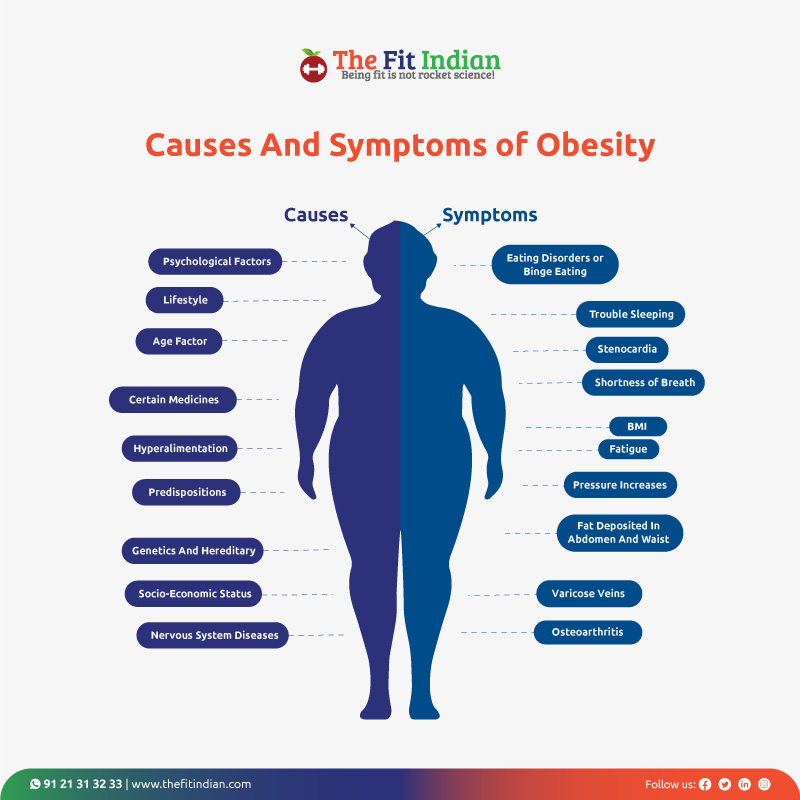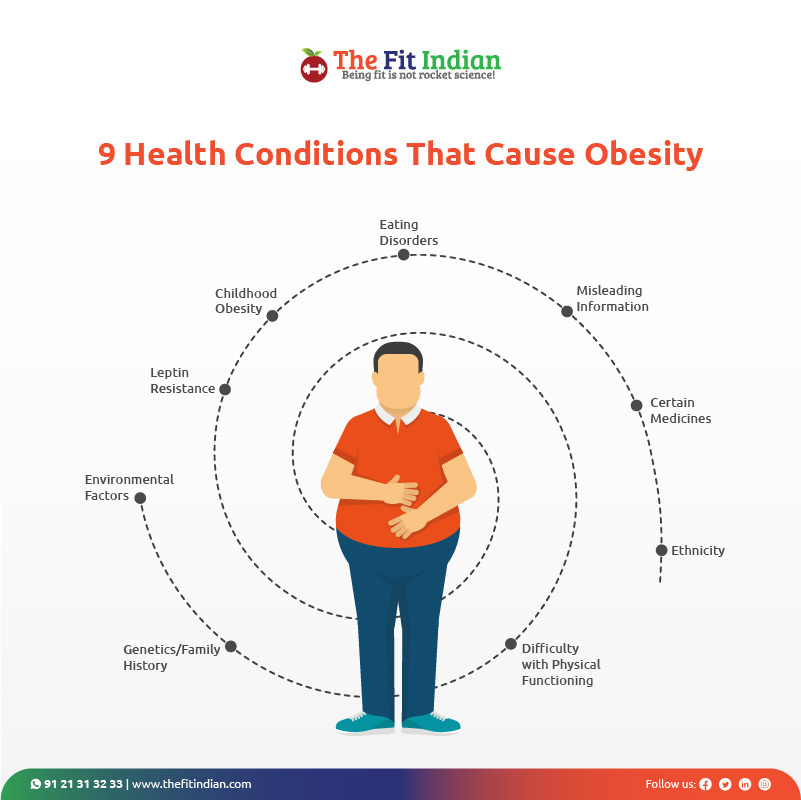9 Health Disorders That Cause Obesity – Causes, Symptoms and Diet Plan
| Author: Manoja Kalakanti
Obesity has grown into a pandemic affecting millions across the globe. According to WHO (World Health Organization), over 650 million people suffered from obesity in 2016. And the number shows no sign of dwindling; instead, it is on the rise.

Obesity is often attributed to the excess calorie intake compared to the calories burned. Thereby it has been associated with overconsumption of food and lack of physical inactivity. While this is true and a major cause of the condition, there are myriad other factors or reasons for obesity. In this article, we’ll talk about the 9 health disorders and other factors that cause obesity and a comprehensive Indian diet plan to manage weight. First, let’s look at the causes and symptoms of obesity.
Obesity – Risk Factors and Symptoms
Obesity is a medical condition that is associated with excess fat in the body or excessive weight. The ideal way to define or diagnose it would be through the BMI (Body Mass Index). According to WHO, an adult with a BMI greater than or equal to 25 is overweight, and those with a BMI greater than or equal to 30 is considered to be obese. Obesity is much more than just a large waist or bulky appearance; it can have far-reaching consequences if not arrested at an earlier stage.

The effects of obesity in the long term can be devastating. It could lead to an innumerable number of health issues. Some of the consequences of obesity are – type-II diabetes, high blood pressure, heart diseases, stroke, gallbladder disease, joint pains in the knees or lower back, low libido, sleep apnea, and back pain. In order to prevent or successfully manage the condition, it is imperative that you understand the causes and the symptoms of obesity.
A. Risk Factors of Obesity
Obesity is a far more complex condition than generally perceived. While calorie intake and expenditure do play a critical role, there are numerous other factors that may lead to the condition. These are some of the most common risk factors:
1. Lifestyle
This is perhaps the driving force behind the spurt of obesity cases over the turn of the century. The change in the way we work, commute, and eat has led to an increase in many diseases. Eating foods high in fats and sugars, eating late at night, change in food habits and smoking affect our health.
- Unhealthy Diet
Unhealthy food habits have become a norm today. The rising popularity of western diets, especially fast food, high in fats, salt and sugar, has resulted in poor health. High alcohol intake, consuming sweetened drinks, and binge eating have become a part of the regular diet. Try consuming healthy whole foods such as whole grains, fruits, vegetables, pulses and dry fruits. Avoid skipping breakfasts, limiting sodium, reducing portion size, and eating multiple small meals in a day.
- Physical Inactivity
A lack of physical activity and an unhealthy diet are the primary reason behind most obesity cases. Staying inactive for a long period and a lack of exercise can result in an increase in fat deposits. Several studies even suggest that physical inactivity is the most significant factor behind the surge in obesity and not high-calorie consumption. The National Health and Nutrition Examination Survey conducted by the Centers for Disease Control and Prevention concluded that the ideal amount of exercise required was 150 minutes of moderate physical activity a week or 75 minutes of vigorous exercise.
- Sedentary lifestyle
The increasing urbanization has led to a change in lifestyle and resulted in a rise in a sedentary lifestyle. Long periods of inactivity can impair the body’s ability to break down fat and also reduce metabolism. Try to reduce screen time and regular exercise or stretch.
2. Age Factor
Obesity can affect anyone, even children; this can be observed with the number of cases of childhood obesity. As you age, it becomes more important to constantly exercise and maintain a healthy diet. The amount of muscle reduces as you grow older; this results in a slower metabolism. As you age, physical activities also reduce; thus, you burn fewer calories.
3. Certain Medicines
While some medicines affect your metabolism, others increase your appetite. Steroid hormone medicines like prednisone or birth control pills, medication for diabetes, such as insulin, can cause weight gain.
4. Socio-Economic Status
Social and economic factors have been shown to have a direct relationship with obesity. It impacts the food you eat; for example, financially poor populations are less likely to access healthy, nutritious foods than their wealthier counterparts. The method of cooking, space to exercise, and other influences vary depending on the socio-economic status.
5. Psychological Factors
Many individual’s use eating as a coping mechanism to deal with various emotional situations. Boredom, anger, frustration, stress, anxiety and sadness can lead to binge eating. To prevent this, try to understand where the hunger is coming from. Ask yourself, is it real hunger or an emotional response?
6. Genetics and Hereditary Predisposition
Some people are genetically predisposed to gain weight. It can be inherited, but the genetic influence may drastically vary in individuals. Treating obesity becomes easier if the scale of genetic influence in weight gain in an individual is known.
Other causes include hyperalimentation and nervous system diseases. Small changes in your lifestyle and diet could make a huge difference in the management of the condition. If other causes are responsible for obesity, consult a doctor. Also, look out for the symptoms as shown below.
B. Symptoms of Obesity
The BMI score is considered to be the best way to diagnose obesity. But there are several other typical symptoms as well. Look out for these symptoms of obesity.
1. BMI (Body Mass Index)
A BMI score is the most trusted and easiest way to diagnose obesity. An adult with a BMI of 30 or more is considered to be obese.
2. Trouble Sleeping
Lack of sleep and irregular sleeping patterns can result in many health problems. People with obesity are more likely to experience sleep-related problems such as insomnia, sleep apnea, snoring and trouble sleeping. Talk to your doctor to find a way to get enough sleep until you are able to reduce your weight.
3. Shortness of Breath
Breathing problems, including shortness of breath, is another classic problem associated with obesity. The pressure that the extra fat that puts on the chest and the abdomen results in shortness of breath.
4. Osteoarthritis
The extra weight puts immense pressure on the joints resulting in osteoarthritis. The condition can be extremely painful and result in restrictions in movement. This restriction leads to inactivity, thus resulting in more weight gain.
5. Varicose Veins
Due to the excess weight, there is immense pressure on the leg veins and their valves. Over time the restrictions in the blood flow due to the pressure of extra weight results in problems in pumping the blood back. This causes the veins to expand, leading to varicose veins.
6. Fatigue
Obesity causes a lack of quality sleep, which results in fatigue and tiredness during the day. Another reason for fatigue in obese people is chronic inflammation caused by the condition.
7. Fat Deposits in Abdomen and Waist
The ‘’potbelly’’ or the ‘’beer belly’’ is considered a clear sign of obesity. This excess of visceral adipose fat is also called central obesity.
Many of these symptoms commonly occur in other conditions. But, if you observe a couple of these symptoms, it is wise to consult a doctor immediately. Now let’s take a look at the 9 health disorders and other factors that cause obesity.
9 Disorders That Cause Obesity
The personal choices and a lack of willpower of an individual are often considered to be the reason for obesity. It is attributed merely as an addiction to junk food, excessive eating and lack of physical activity. It is important to take into account other factors that can also cause the condition. Although it is often a result of lifestyle choices, some people are predisposed to putting on more pounds.

It is vital to understand the factors that cause the condition in order to draw a proper treatment plan and ward off obesity risk factors.
1. Difficulty with Physical Functioning/Disability
Disability or any hindrance in proper physical functioning could cause restrictions and a disability to perform physically demanding tasks. This leads to a lack of physical activity, which in turn can cause weight gain.
2. Genetics / Family History
Obesity can be inherited; some people are predisposed to weight gain. But the influence the genes have on obesity differs from one individual to another.
3. Environmental Factors
Your environment can highly influence your eating and lifestyle habits. A stressful environment, fast foods, packaged foods, sedentary lifestyle are environmental factors that can cause obesity.
4. Leptin Resistance
The hormone leptin is increasingly believed to be the cause of weight gain. Leptin resistance is a condition in which the body does not respond to this hormone, thus leading to weight gain. Leptin is a hormone that is produced by the body’s fat cells and is often called the ‘’starvation hormone’’. Leptin’s role is to signal the brain that there is enough fat in the body; hence there is no need to eat any further. When the leptin fails to signal properly, the brain will urge the body to eat more, even though there is enough storage of energy. This leads to overeating, thus causing obesity.
5. Ethnicity
Certain ethnicities are more prone to weight gain. For example, African-Americans have a higher percentage of the obese population in the US than their Asian, Hispanic, and Caucasian counterparts. Social and economic factors influence this difference.
6. Eating Disorders
Eating disorders such as binge eating disorders can cause significant weight gain in a short span. Binge eating is often a coping mechanism triggered by emotions.
7. Misleading Information
There are many so-called “fitness pundits” with no medical background offering health-related advice on social media platforms. This advice can often lead to health problems. Misleading information on food packages can also cause health issues. Often, the foods claimed to be healthy turn out to be unhealthy and may result in weight gain.
8. Childhood Obesity
According to studies, children who are obese are more likely to be obese in adulthood.
Childhood obesity can result in more severe health risks.
9. Certain Medicines
Certain medicines can also lead to weight gain. Some antidepressants, antipsychotic medications, anti-seizure medications, steroids, and diabetes medications can cause obesity.
Some of these disorders are difficult to control or literally out of an individual’s control. With proper care, you can manage obesity and avoid the consequences of obesity. One of the most important treatment plans for obesity is following a good diet plan.
Indian Diet Plan For Obesity
Diet plays a vital role in both causing the condition and also managing it. A healthy diet including whole foods rich in nutrients consisting of the required calories can effectively control your weight.

Follow this diet plan to manage your weight and avoid obesity-related diseases.
| DIET PLAN FOR OBESITY (1200 KCals) | |
| Meal plan | Options |
| Early Morning | Flaxseed boiled water – 1 glass
or Luke warm lime water – 1 glass or jeera water – 1 glass |
| Breakfast | 1 cup oats meal porridge with 2 boiled egg whitesor
Brown bread with a stuffed sandwich and orange juice |
| Pre-lunch | Strawberry smoothie – 1 glass
or Papaya – cube pieces – 1 cup or Almond milk – 1 glass |
| Lunch | Brown rice with chicken curry – 1 cup
or Steamed rice with cauliflower mashed potatoes curry or Spinach roti with 1 cup curd (low-fat milk) |
| Evening tea | 1 cup green tea with nuts (soaked almonds)
or 1 cup oolong tea with 1/2 cup boiled sprouts |
| Dinner | Steamed fish with stuffed veggies
or Mixed vegetable salad vs chopped garlic with yoghurt or Boiled pepper chicken with lettuce |
| Bedtime | Warm milk with turmeric – 1 glass |
| Nutritious benefits with calories | |
| Early Morning | Calories-0
Benefits: Flax seeds, jeera water and lime water detoxifies our body and enhances metabolism |
| Breakfast | Nutrition value- 200 KCals approximately
Benefits: As a fuel to energise your day. Oats and brown bread are good for metabolism and decrease leptin resistance. Egg whites are rich in protein. Orange juice relieves constipation |
| Pre-Lunch | Nutrition Value – 100 KCals approximately
Benefits: Strawberry smoothie, papaya, and almonds are good sources of vitamin C, improve digestion, and get rid of gastric issues. |
| Lunch | Nutrition Value – 320 KCals approximately
Benefits: To heal and a good weight loss option – brown rice, steamed rice, whole wheat flour help in leptin resistance, are rich in fibre, and provide good satiety. In curries – chicken, cauliflower, potatoes and spinach. They are rich in protein, fibre, vitamins and anti-inflammatory agents. |
| Evening Tea | Nutrition Value – 50 KCals approximately
Benefits: Green tea and oolong tea reduce free radicals, are good antioxidants (catechins, flavonoids, and polyphenols) |
| Dinner | Nutrition Value – 400 KCals approximately
Benefits: In dinner – chicken (is a rich source of protein), Fish (Tuna) is a good source of omega, is good for the heart, boosts brain health, where the cooking method adopted is steamed or boiled and lots of veggies are added too. |
| Bed time | Nutrition Value – 77 KCals approximately
Benefits: Milk with turmeric is a natural aspirin, prevents arthritis, viral infections, colds and cough. |
While the above diet can help you manage the condition to a certain extent, combining it with exercise is crucial to get the desired results. For a customized diet plan, you can always seek nutritional support from certified nutritionists.
Bottomline
Obesity is a growing menace to society, and the recent spurt in cases could be attributed to the changing lifestyle. But the condition is much more than just lifestyle or food habits; factors such as genetics, medications, and disorders also play a part. Understanding the cause of obesity and making changes will help you reverse the condition. If the diet is the cause, then following a diet plan may help. A simple tweak in your diet and lifestyle can go a long way in getting rid of that stubborn beer belly and avert severe health risks. If your BMI score indicates obesity, consult a doctor immediately.
FAQ’s
1. What causes obesity?
Obesity is generally caused due to overeating and exercising too little. Other factors such as genetics, medications, and environment can also cause the condition.
2. Does obesity cause hair loss?
Obesity may not directly cause hair loss, but the health conditions that are caused due to obesity may be responsible for hair loss.
3. What disorders can cause obesity?
Below are some of the disorders that can cause obesity:
- Difficulty with Physical Functioning/Disability
- Genetics / Family History
- Leptin Resistance
- Eating Disorders
- Childhood Obesity
4. What are 5 diseases caused by obesity?
Below are the 5 diseases caused by obesity:
- Type 2 diabetes
- Heart disease
- Stroke
- Osteoarthritis
- High blood pressure
5. Will Obesity increase heart rate?
Obesity can cause rapid and irregular heartbeats, leading to heart disease, stroke, and other health problems.
6. What are the signs and symptoms of obesity?
Some of the most common signs and symptoms of obesity are:
- Joint and back pain
- Fatigue
- Excessive sweating
- Depression
- Lack of proper sleep
7. Why do I keep gaining weight even though I don’t eat much?
It’s not just the amount of food you eat but the type that affects your weight. Eating even a little processed and junk food could lead to weight gain. There are other factors like sedentary lifestyle, genetics and medications that also have an impact on your weight.
8. How can we prevent obesity?
We can prevent obesity by:
- Eating healthy whole foods
- Avoiding processed food, sugary and high-fat foods
- Exercising regularly
- Getting adequate sleep
9. Can obesity be comorbid?
Yes, it can. People with obesity are at risk of developing conditions such as hypertension, cardiovascular disease, stroke, type 2 diabetes, and gallbladder disease.
10. Can obesity be genetic?
Yes. Genes play a key role in obesity. But your habits also have an impact on weight gain.




Manoja Kalakanti